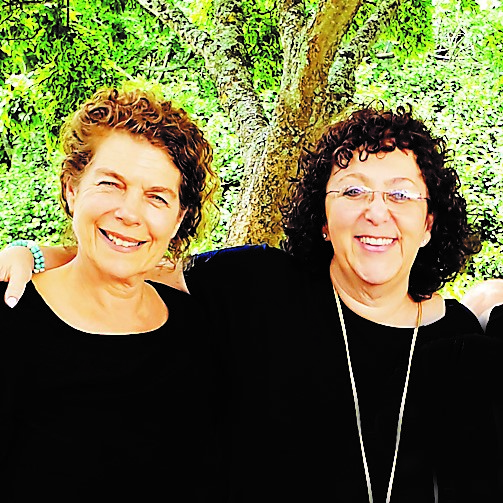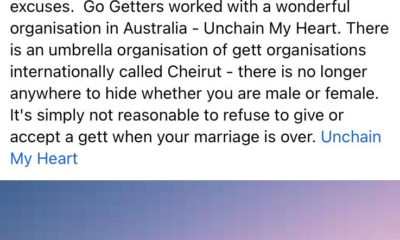
Featured Item

Getting tough on gett abusers
Published
4 years agoon
Getting a divorce is tough enough, but having your spouse refuse you a gett (Jewish divorce) can be torturous. This is where Go Getters – the South African Gett Network has stepped in to help.
“All the cases we work on are tragic because they always involve long-term abuse,” says Michelle Blumenau and Balu Nivison, the co-founders of the organisation. “The nature of gett refusal is abuse – one person exerting power over another. It generally involves financial abuse too.
“We most often become involved via the Beth Din. It will flag the intractable cases, and we see how we can help,” says Blumenau, pointing out that it’s unusual for gett activists to have such a good relationship with the Beth Din.
“We’re supported by a legal team and volunteers. We try to understand the refuser’s network – family, work, friends, people who can influence them,” says Nivison. “Abusers like to do so in the dark. We focus on moving what they are doing into the light – it makes them extremely uncomfortable. For instance, we might let his best friend know that he isn’t paying maintenance for his kids.”
The first case they worked on was the reason they started the organisation. “The husband had an affair with a non-Jewish woman, and left his first wife and children after it came out that he’d fathered a child with his girlfriend,” says Nivison. “He went on to father two additional children while still married.
“After their civil divorce, the man planned to marry his girlfriend while still married to his Jewish wife [according to Jewish law]. He refused to give the gett unless he was paid R2.5 million by his first wife.
“We worked relentlessly on this case with the help of the Beth Din and the Union of Jewish Women. The new couple and their three kids emigrated to the United Kingdom after the man was put in cherem [excommunicated] in South Africa. We pursued the husband to the UK, and worked with the Beth Din there. This case went on for years until the UK Beth Din threatened him with cherem. He relented and gave the gett.”
In another case, “The marriage had broken down beyond repair. Neither would move out,” Blumenau says. “For seven years, they continued living together in the most terrible circumstances. He was committing financial and other abuse. He was very adept at abusing the court process too. A trial date would be set, and he would fire his lawyers a few days before. He did that three times. The fourth time, the wife took her kids to court. The kids asked to see the judge privately and begged the judge to sort out the civil divorce immediately.
“She got her divorce that day, and the gett was included in the divorce settlement,” says Blumenau. However, in spite of being ordered to give the gett within 30 days, he refused. As this was a religious couple, Go Getters liaised with two rabbis the man was close to. “The rabbis defended him, which was extraordinary. We threatened arrest as he was in contravention of a court order, and that’s how we got that gett,” says Blumenau.
“The wife paid about R900 000 to get her divorce, which she funded via her cancer pay out. He was obligated to pay just R12 000 a month all in, and after the divorce, he left the country.”
In a third case, they supported a woman whose “well-regarded” husband was abusive. “Initially, she had no strength to even pursue a gett – she was broken and traumatised,” says Blumenau. “All her children were in psychiatric care. We saw that he was being protected within his community, whereas she had been ousted. He was withholding the gett as he wanted access to their children. She had psychological reports advising against it.
“The Beth Din asked for additional reports. We helped her explain to the rabbinic authorities that there were sufficient reports [advising] that he shouldn’t see the kids,” says Blumenau. The husband eventually gave the gett to avoid exposure, but continued to pursue access to the children. “One of the children eventually spoke out, saying that the father had been sexually abusive.”
In its most recent case, Go Getters sent a letter to the husband’s company explaining that gett refusal is the Jewish equivalent of gender-based violence. This was just prior to level-5 lockdown. “We got the gett during level 3, with the women, dayanim, and witnesses in masks,” says Nivison.
The organisation has had four cases in which the wives refused to accept a gett, some of which are still unresolved. In one, the husband had several affairs and his wife refused the gett to prevent him from remarrying. “The case was eventually resolved after civil proceedings, as there was a significant financial incentive for her to accept the gett,” says Blumenau. “Women refusing to accept a gett is on the rise, but men refusing to give the gett is still more common.”
The case of Hermann “Hershy” Fried is by far the organisation’s toughest case. His divorce in Israel was never finalised, as he left the country in spite of a court order prohibiting him from doing so. There is a warrant for his arrest in Israel.
He has since gone from country to country, keeping his wife tied to their non-existent marriage. “Balu has a friend from Vienna where Hershy’s wife lives, and we got involved after her friend alerted her to the case,” says Blumenau.
“We put a post on Facebook to pressurise Hershy’s community in the United States to respect the Israeli cherem. When the FBI [Federal Bureau of Investigation] came for him, he fled to South Africa within days of our post,” says Blumenau.
He then travelled between Cape Town and Johannesburg, always staying in the heart of the Jewish community, before leaving for Dubai, where he was barred from shul services, according to Go Getters.
“This case is still unresolved but not without tremendous effort in South Africa. Then Rosh Beth Din Rabbi Moshe Kurstag and the South African dayanim were absolutely magnificent. The last we heard, someone from St Moritz, Switzerland, told us that they wouldn’t let him join their minyan.”
Go Getters’ dream is to “go out of business”. “We live for the day that ways are found to extricate women in particular from their dead marriages. There is already a way out for men. We like to believe that where there’s a rabbinic will, there’s a halachic way,” says Nivison. “We believe that by the Orthodox world not actively seeking an acceptable solution, we add to the abuse.
Blumenau suggests that Jewish couples getting divorced should ideally secure their gett prior to their civil divorce. “If you don’t, you must highlight this for the judge, and insist that there is a clause that mentions the gett in your divorce agreement,” she says.










